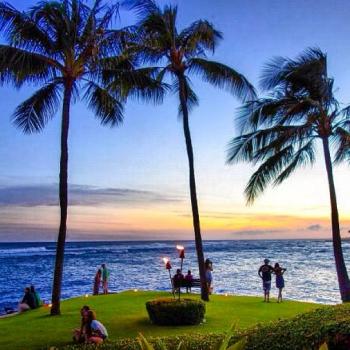Editors' Note: This article is part of the Patheos Public Square on Global Care: Why We Need More Than One Earth Day in a Year. Read other perspectives here.
One of my favorite places in all of America is the St. Lucie River in South Florida. The St. Lucie is a wide tidal river connected to the Indian River Lagoon — the most biodiverse estuary system in the United States. It's also where my grandmother lives, and I love going kayaking, fishing, and exploring along its sand flats, oyster reefs, and mangrove-lined shores.
As I write, however, the St. Lucie River is in trouble yet again. Many years ago the Army Corp of Engineers built a complex system of dams, levees, and canals to drain the Everglades for agriculture and development. As a result, water now builds up in Lake Okeechobee — a massive inland lake — instead of draining slowly south through the Everglades. To prevent catastrophic flooding during wetter periods, the pesticide- and fertilizer-rich water buildup has to be funneled out through canals and dumped into sensitive ecosystems such as the St. Lucie.
It's a somber sight, sitting here on the banks of the river, looking down into the contaminated and, according to local health departments, even disease-causing waters that should be teaming with all kinds of marine life. It reminds me that God's world, though very good, is also groaning.
It's not simply contaminated discharges, however, that are to blame for the degradation of the beautiful St. Lucie River. Likewise, it's not just carbon pollution that's to blame for climate change, or climate change that's to blame for increasing extreme weather, rising seas, food insecurity, forced migration, and a host of other crises. Rather, our interconnected socio-environmental problems are symptoms of deeper moral ills — ills such as hubris, greed, selfishness, apathy, and every other kind of corruption.
We live in a corrupted world and the brokenness that runs deep in creation is also the brokenness that plagues our societies and each of us as individuals. As a Christian, this is what I know as the problem of sin. Sin entered the world when humans rebelled against and asserted themselves over God, in what we have come to refer to as the Fall. I can no more save the world from sin than I can save myself. Generations of striving demonstrate how impotent we are when it comes to getting ourselves out of this mess and making things right.
At the end of the day, what we, our societies, and all of creation need is a solution to sin. As a Christian, there is only one solution to sin that I know of, and that is Jesus Christ and his sacrifice and triumph on the cross. Jesus, who is fully God, came down to earth and became fully human as well, that he might show us how to live and then die in our place to pay for our sin once and for all. He then rose from the dead and by overcoming sin and death he paved the way for all things to be restored to wholeness and reconciled back to God (Colossians 1:15-20). Sometimes we Christians have been guilty of suggesting that Jesus came only to save people but, in the words of a good friend, "the cross is for all of the Fall." Everything that has been corrupted and broken because of sin is to be redeemed and transformed because of Christ. This is what we call the gospel, which literally means "good news."
The gospel changes everything for us and for the earth. Three implications stand out here:
First, creation matters. That God took on human flesh and came to live as one of us on earth reinforces the consistent biblical testimony — articulated from the very first chapter of the very first book of the Bible — that the physical creation is good (Genesis 1). It has intrinsic value apart from any aesthetic or instrumental use we may find for it, for the simple and yet ultimate reason that God says so. As something of such value, we as God's people have every reason to steward and protect this creation, both human and non-human, not just for ourselves, our neighbors, or future generations, but for God.
Second, there is hope for both us and for the earth. The Bible begins with creation and ends with new creation. We read that the destiny of the earth is intertwined with our own and that, like us, it too will be set free from its groaning and oppression to sin (Romans 8). The world isn't just spiraling downward into despair and destruction. The biblical vision we have of the future is one where, by the love and power of God, creation will be refined and renewed, and where human civilization and the natural world will be reconciled to once again flourish in a rich and peaceful relationship with each other and God (Revelation 22).




